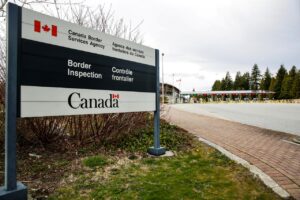
On July 22nd, 2020, Federal Court Justice Ann Marie McDonald announced a major decision in the advancement of immigration rights in Canada by striking down the Safe Third Country Agreement (STCA) between Canada and the U.S.
Under the Canada-U.S. Safe Third Country Agreement (STCA) which came into effect in 2004, refugee claimants must request refugee protection in the first “safe” country they arrive in, which is a designation that Canada only grants to the US, under the Immigration and Refugee Protection Act. Pre-pandemic, this applied to refugee claims at official land ports of entry and meant anyone seeking asylum at official Canada-US border crossings would be turned back to the country they are trying to enter from, unless they qualified for an exception1.
The Canadian Council for Refugees, in conjunction with Amnesty International, the Canadian Council of Churches, and multiple other litigants launched a case against the Government of Canada, stating that the designation of the U.S. as a safe third country was no longer applicable, and that the STCA itself is in violation of the Charter of Rights and Freedoms, specifically section 7 (life, liberty, and security of the person), and section 15 (equality before and under law, equal protection and benefit of law). This case was founded on the idea that the U.S. was not safe for refugees and that the STCA subjects those seeking asylum to refoulement (the forced return of refugees to where they may face persecution), which is in violation of the 1951 UN Refugee Convention.
Though the Court did not find it reasonable to rule on the policies and practices of the asylum process in the U.S., it did find that the STCA violates the rights guaranteed under section 7 of the Canadian Charter to an extent that is unjustifiable under Section 1. As section 7 is violated, the question of section 15 was not necessary to be ruled upon. The Federal Court Justice has suspended the decision for a period of 6 months to allow parliament to respond and make the necessary provisions to its policies2.
Although Canada’s commitments to those seeking asylum have changed over the past several months due to increased pandemic restrictions, the need for assistance has only grown, especially in the face of increasing concerns over the U.S.’ treatment of refugees. Unfortunately, there have been policies in Canada that implicitly violate the rights of refugees and are disguised as a form of “border management”, which ignore the consequences of denying claimants the opportunity to file for asylum.
Since February of 2017, over 54, 000 refugee claims have been made by individuals that have entered Canada through irregular border crossings3. This is partly a result of the anti-immigrant discourse that has been circulating in the political context of the US for many years now and may very well be influencing Canadian policies as well. Across Canada, those waiting to hear about their cases are continuing to contribute to essential services, working across all sectors.
At a time of international emergency, Canada’s responses to the most vulnerable are crucial, as fundamental rights for all individuals regardless of status, should be non-derogable. For immigration rights activists across the world, this ruling is a major step in the right direction
for a country that advocates for the fulfillment of humanitarian obligations. Looking onward, this means that when the STCA is officially rendered ineffective as of January 22, 2021, thousands of migrants that make their way through the U.S. to reach the border of Canada will be given a chance to plead their case, and not be unfairly subjected to the worsening conditions for asylum-seekers in the U.S.
To explore your options and get trusted advice for how to proceed in the refugee claimant process, contact OWS Law, where you will be assisted in your language of choice.
________________________________________________________________________________________________________________
This post was written by Oshish Ungras our awesome summer volunteer!
1 “Coronavirus disease (COVID-19): refugees, asylum claimants, sponsors, and PRRA applicants” from Government of Canada; Accessed at: https://www.canada.ca/en/immigration-refugees-citizenship/services/coronavirus-covid19/refugees.html
2 “Canadian Council for Refugees v. Canada (Immigration, Refugees and Citizenship” from Federal Court of Canada; Accessed at: https://decisions.fct-cf.gc.ca/fc-cf/decisions/en/item/482757/index.do
3 “Coronavirus: Trudeau says irregular migrants will be turned away at Canada-U.S. border” from Global News; Accessed at: https://globalnews.ca/news/6707593/coronavirus-trudeau-says-irregular-migrants-will-be-turned-away-at-canada-us-border/
